Keywords are the words and phrases users type into search engines to find the content they are looking for on the internet.
You can research the keywords that are searched for most often and use that information to decide which topics to cover in your website content. By including those phrases in your WordPress posts and pages, users will be able to find your site in search results.
You can also optimize the keywords used in your content to rank higher on search engine results pages. This is an effective way of increasing traffic to your website.
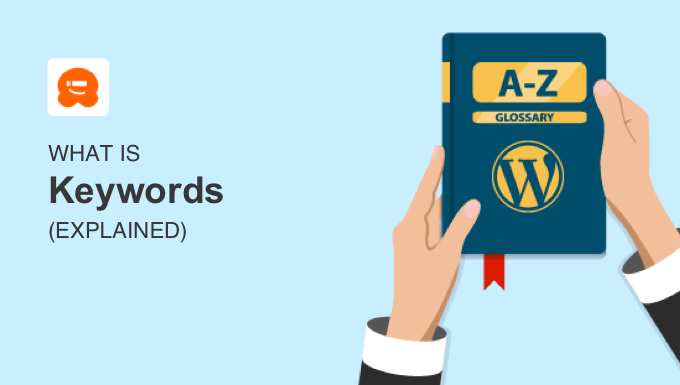
What Are Keywords and Why Are They Important?
Internet users perform 3.5 billion Google searches every day worldwide. They do this to find content on the web that they are interested in learning about.
That makes search engines some of the best sources of traffic to your WordPress website. You can optimize your content to rank higher on search engine results pages, which is known as SEO or search engine optimization.
The words and phrases typed into search engines are known as organic keywords. Discovering and using commonly used keywords is an important SEO technique.
Semantic keywords, which are also called Latent Semantic Indexing (LSI) keywords, are phrases related to the topics you want to write about on your site.
For example, if your main keyword is ‘online marketing’, then some semantic keywords could be ‘digital marketing’ and ‘SEO’.
You should try to include LSI keywords in your content to provide your readers with the information they need.
Long-tail keywords are longer and more specific phrases that users search for once they have a more accurate idea of what they need. For instance, the keyword could be ‘best digital marketing agencies in New York’.
A keyword like this may indicate that the user is ready to make a purchase or decision. So, using long-tail keywords can help increase conversions on your site.
Which Keywords Are Users Searching For?
To find out which words and phrases users are searching for, you will need to do keyword research. Discovering keywords helps you find content ideas that people are actually looking for, and writing about them will bring more traffic to your site.
Keyword research tools help you discover the best keywords with the highest search volume. They will also help you find keywords that fewer websites are targeting. If you choose those keywords, then you will have less competition trying to rank for them.
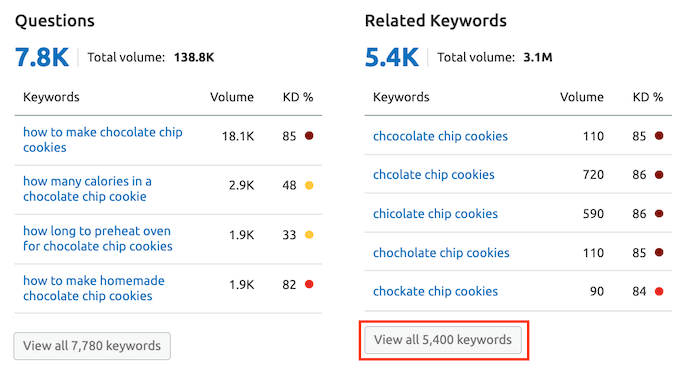
With a tool like LowFruits, you can even discover low domain authority websites that are ranking for your desired keywords. The more weak spots there are, the easier it will be to rank for that keyword.
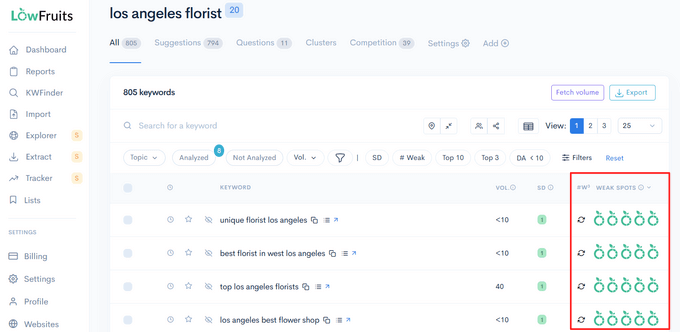
You can learn more in our guide on how to do keyword research for your WordPress blog.
You can also discover which keywords are trending by visiting the Google Trends website. This tool helps you analyze the popularity of a search term in Google and gets its data from Google Search, Google News, Google Images, Google Shopping, and YouTube.
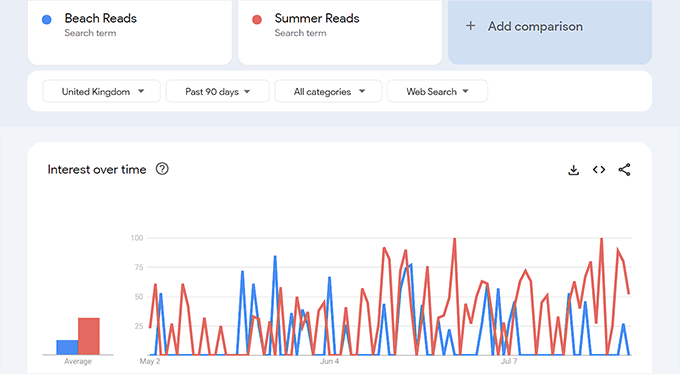
You will also want to discover the keywords people use to find your own WordPress site. This lets you focus on what’s working and stop spending time on what’s not.
One of the best ways to do this is with All in One SEO (AIOSEO), which is the best WordPress SEO plugin on the market. Its Search Statistics feature will show you the keywords your website is ranking for inside your WordPress dashboard.
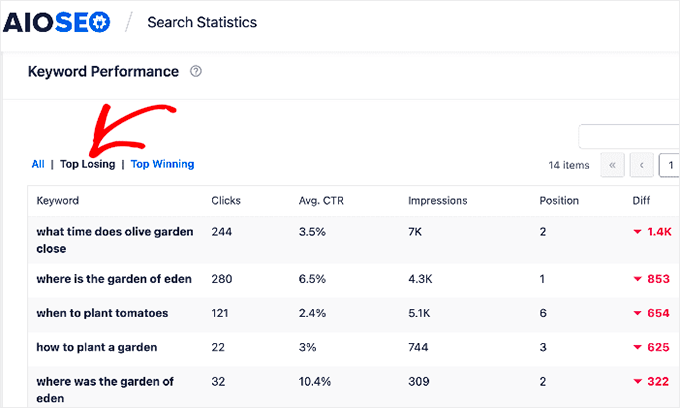
The ‘Top Losing’ and ‘Top Winning’ tabs help you see at a glance which keywords are improving and declining in rankings.
You can now go ahead and check whether your individual WordPress posts are ranking for the right keywords.
How to Use Keywords to Optimize Your Content for SEO
Once you know the right keywords to use on your website, you can use them to optimize your content for SEO.
To do this, you need to add the keywords to key areas of your content.
For example, you should use relevant keywords in the:
- Post title
- URL or slug
- Meta description
- Image name and alt text
- Paragraph text.
However, you should make sure you use the keywords in a way that sounds natural and prioritize making your content readable and understandable.
You can use All in One SEO to improve your use of keywords in WordPress posts, pages, products, and custom post types.
The plugin lets you set a focus keyphrase, which is the primary topic of a specific piece of content. In other words, it’s the phrase or keyword you believe users will type into search engines to find your content.
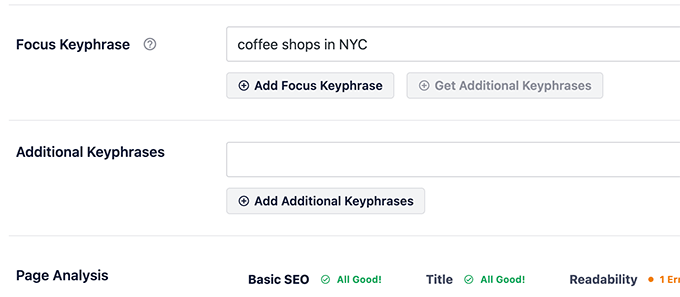
Once you’ve done that, AIOSEO will show a TruSEO score and provide suggestions on how to improve the score.
For example, it will check that you are using the keyword in all the right places.
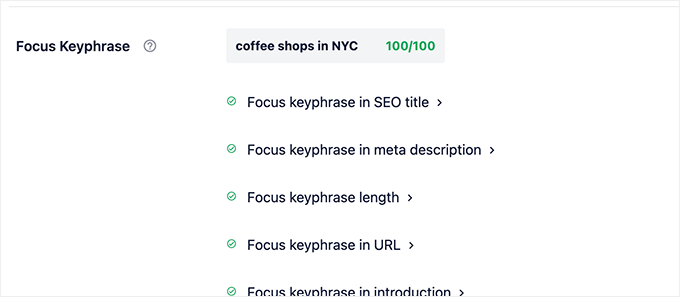
Another way to make sure you are adding the right keywords to your content is with an online content optimization tool such as SEOBoost, Clearscope, or the Semrush SEO Writing Assistant.
These tools will list important keywords that your competitors are using in similar content.
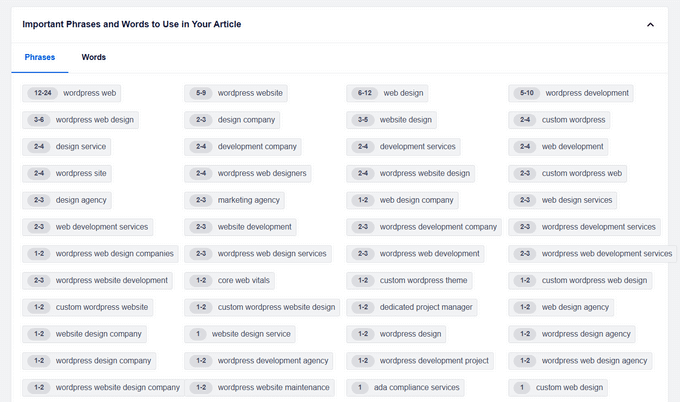
How to Avoid Keyword Stuffing
We said earlier that you should add keywords to your content in a way that makes sense and sounds natural. That’s because Google will penalize your site if you use too many keywords or simply add the same search term repeatedly.
This is called ‘keyword stuffing’ and should be avoided.
Here is an example of keyword stuffing:
Our New York City coffee shop, located in New York City, is the best New York City coffee shop in town. Our New York City coffee shop offers a cozy New York City ambiance that no other New York City coffee shop can match. With a wide selection of coffee beans, our New York City coffee shop ensures that coffee enthusiasts visiting New York City will find the best coffee beans in our New York City coffee shop. Come to our New York City coffee shop for a delightful experience at our New York City coffee shop!
That’s not very readable, leading to a poor user experience. Plus, search engines will detect that it contains keyword stuffing and rank the content poorly.
You can check your posts for keyword stuffing using WPBeginner’s free Keyword Density Checker. Simply paste the URL to your post or the content itself, and the tool will analyze the content for keyword density and frequency.
It will list all 1-word phrases, 2-word phrases, and 3-word phrases by frequency and highlight the keyword density in red if it is too high.
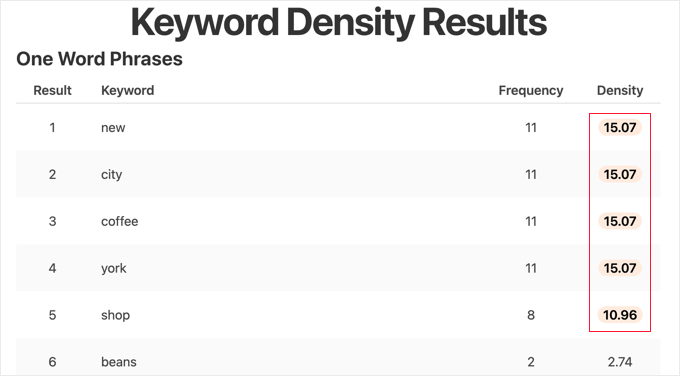
You can then re-optimize your content to make sure you are not overusing keywords.
We hope this article helped you learn more about keywords in WordPress. You may also want to see our Additional Reading list below for related articles on useful WordPress tips, tricks, and ideas.
If you liked this article, then please subscribe to our YouTube Channel for WordPress video tutorials. You can also find us on Twitter and Facebook.
Additional Reading
- Ultimate WordPress SEO Guide for Beginners (Step by Step)
- 11 Tips to Optimize Your Blog Posts for SEO Like a Pro (Checklist)
- 9 Best Online Content Optimization Tools for WordPress (in 2024)
- How to Add Keywords and Meta Descriptions in WordPress
- How to Use the SEO Writing Assistant in WordPress to Improve SEO
- How to Use Google Trends to Improve SEO and Grow Your Business
- How to Check If Your WordPress Blog Posts Are Ranking for the Right Keywords
- 8 Best Keyword Research Tools for SEO in 2024 (Compared)
- How to Properly Use Focus Keyphrase in WordPress (Beginner’s Guide)
- How to Do Keyword Research for Your WordPress Blog




